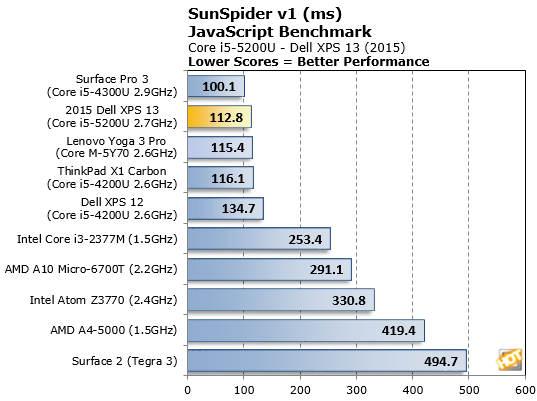We began our testing the Dell XPS 13 with SiSoftware's SANDRA 2015 the
System
ANalyzer,
Diagnostic and
Reporting
Assistant. We ran four of the built-in subsystem tests that partially comprise the SANDRA 2014 suite (CPU Arithmetic, Multimedia, Physical Disks and Memory Bandwidth).
 |
| SiSoft SANDRA 2015 |
| System Level Synthetic Benchmark Testing |
|
Memory and Physical Disk Tests
In terms of CPU arithmetic performance, the new Core i5-5200U that powers the 2015 XPS 13 puts up strong number, actually besting a Core i7 4500U from the previous Haswell series in both integer and floating point performance, in both the Arithmetic and Multi-Media tests. Memory performance is a toss-up, with better Integer memory bandwidth for Haswell and better Floating Point bandwidth for Broadwell-U. Taking a closer look at other important subsystems, Dell's choice of the LiteOn M.2 SSD in the new XPS 13, proves to be sound with the machine offering up over 480MB/sec in read performance and just edging out drives from Samsung and Corsair along the way.
 |
| SunSpider |
| Javascript Processing Test (CPU) |
|
The Webkit Open Source Project suggest the following about the SunSpider Javascript benchmark...
Unlike many widely available JavaScript benchmarks, this test is:
Real World - This test mostly avoids microbenchmarks, and tries to focus on the kinds of actual problems developers solve with JavaScript today, and the problems they may want to tackle in the future as the language gets faster. This includes tests to generate a tagcloud from JSON input, a 3D raytracer, cryptography tests, code decompression, and many more examples.
Balanced - This test is balanced between different areas of the language and different types of code. It's not all math, all string processing, or all timing simple loops. In addition to having tests in many categories, the individual tests were balanced to take similar amounts of time on currently shipping versions of popular browsers.
Statistically Sound - One of the challenges of benchmarking is knowing how much noise you have in your measurements. This benchmark runs each test multiple times and determines an error range (technically, a 95% confidence interval).

In SunSpider, the new Dell XPS 13 scores well, offering the second best score we've seen to date from an ultralight Windows machine. The Microsoft Surface Pro 3 is able to just squeak out a victory here due to its slightly higher-clocked Core i5-4300U at 2.9GHz. This test does tend to be more clock speed dependent over all but let's look at some real application metrics.












